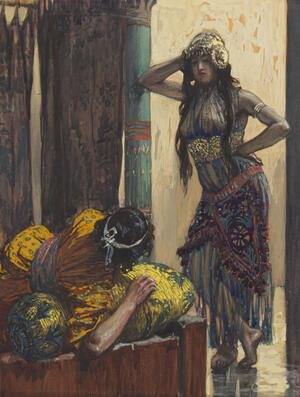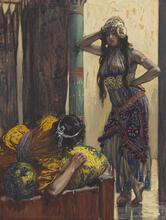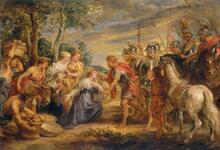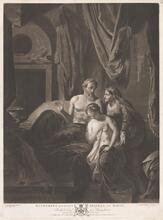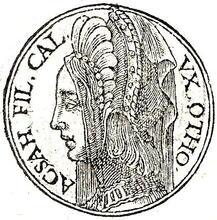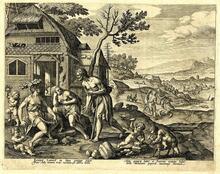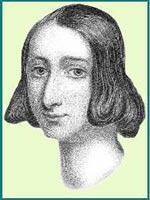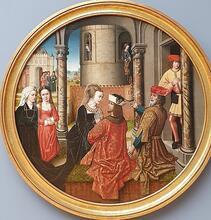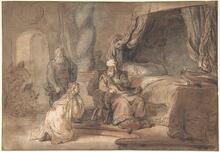Jezebel: Midrash and Aggadah
Jezebel is portrayed by the Rabbis as a wicked woman who represents the negative influence of Gentile women who turned Israel’s heart to idolatry. She is a corrupting influence on her husband Ahab, who is drawn to idolatry and away from God because of her. Her influence on Ahab leads the rabbis to portray him as somewhat less culpable for his actions. Nevertheless, the Rabbis also indicate a favorable aspect of her character.
The Rabbis count Jezebel among the four women who ruled in the world, two of whom were enthroned in Israel (Jezebel and Athaliah), and two who reigned over other peoples (the heathen Semiramis and Vashti) (Esther Rabbah 3:2).
In the midrashic account, Ahab had one hundred and forty sons, seventy in Samaria (who are mentioned in II Kings 10:1), and an additional seventy in Jezreel, who were borne to Jezebel (and who are not mentioned in the Bible). Each of these sons had two palaces, a summer palace and a winter one. The Rabbis apply to these offspring the passage (Amos 3:14–15): “That when I punish Israel for its transgressions […] I will wreck the winter palace together with the summer palace; the ivory palaces shall be demolished, and the great houses shall be destroyed, declares the Lord,” from which some Rabbis deduce that each of Ahab’s sons had four or even six palaces (A type of non-halakhic literary activitiy of the Rabbis for interpreting non-legal material according to special principles of interpretation (hermeneutical rules).Midrash Samuel 2:1). This midrash is meant to demonstrate the great fall of Jezebel and Ahab, with nothing remaining of their so numerous progeny and their considerable wealth and possessions
Jezebel’s Sins
Idolatry was Jezebel’s most grievous sin. She would fatten the prophets of Baal and Asherah, thus vexing God and arousing His ire (Song of Songs Rabbah 1:6:4). The midrash states that when Jezebel, who was the daughter of Ethbaal of the Phoenicians, came into Ahab’s home she taught him pagan practices, and thus he fell into the web of idolatry (Seder Eliyahu Rabbah [ed. Friedmann (Ish-Shalom)], para. 10). Ahab appears in other midrashim as capricious: he worshipped the Lord, but was adversely influenced by his wife. The Rabbis expound his name as Ah-av: a brother (ah) to Heaven, and a father (av) to idolatry. When faced with hardship, he turned to God, as depicted in Prov. 17:17: “A brother is born to share adversity.” Most of the time, however, he was close to idolatry, as a son to his father (BT Sanhedrin 102b). One view argues that Ahab’s merits and transgressions were balanced, while other Rabbis oppose this, and argue that his house was awash in idolatry and his sins more numerous than his merits. Nonetheless, he was forgiven for half his misdoings, since Jezebel donated gold coins to idolatry every day, while Ahab generously gave Torah she-bi-khetav: Lit. "the written Torah." The Bible; the Pentateuch; Tanakh (the Pentateuch, Prophets and Hagiographia)Torah scholars the benefit of his possessions. Since Ahab honored the Torah, with its twenty-two letters, he was rewarded by ruling for twenty-two years (BT Sanhedrin 102b).
Ahab’s Sins
The Rabbis describe how Ahab was drawn after his wife and engaged in idolatrous worship. Jeroboam ben Nebat’s most heinous sins were Ahab’s lightest infractions. There was no plowed field in The Land of IsraelErez Israel on which Ahab did not plant an idol and worship it, of which it is said (Hos. 12:12): “The altars of these are also like stone heaps upon a plowed field” (BT Sanhedrin 102b). Because of such behavior, Ahab is included among the three kings who have no portion in the World to Come (Codification of basic Jewish Oral Law; edited and arranged by R. Judah ha-Nasi c. 200 C.E.Mishnah Sanhedrin 10:2). The Rabbis derive from Elijah’s prophecy concerning Ahab (I Kings 21:21): “I will cut off from Israel every male belonging to Ahab, the one who is shut up, and the one who is forsaken”: “shut up”—in this world; “forsaken”—in the World to Come (BT Sanhedrin 102b). Another midrash adds that Jezebel and her seventy sons also lost both this world and the next. This is similar to a king whose servant brings him a gift of seventy jugs of oil, while saying things that ire the monarch. In the latter’s anger, he smashes all the jugs and spills out all the oil that his servant had brought him. This parable portrays the sons of Jezebel as good oil that has nothing wrong with it, but who were punished because their parents had vexed God by their own idolatry. The midrash continues that Jezebel was the cause of all this, by exerting a negative influence on her family and by destroying her house with her own hands. Prov. 14:1: “but folly tears it down with its own hands” aptly describes Jezebel and other women of her ilk (Seder Eliyahu Rabbah 10).
The The interpretations and elaborations of the Mishnah by the amora'im in the academies of Erez Israel. Editing completed c. 500 C.E.Jerusalem Talmud relates that when R. Levi would expound I Kings 21:25: “Indeed, there never was anyone like Ahab, who committed himself to doing what was displeasing to the Lord,” he would censure Ahab’s conduct, since this verse attests that none of all the kings of Israel had committed acts as notorious as those of Ahab. At night Ahab came to R. Levi and asked him: “How have I sinned against you, and what crimes have I committed against you? Why do you read only the beginning of the verse, and not its end, that says: ‘at the instigation of his wife Jezebel’?” From that day forth R. Levi portrayed Ahab in a positive light when he expounded the verse, for of all the kings of Israel who had irked the Lord, Ahab was the only one whose wife had provoked him to do so. Corresponding to the six months during which R. Levi had elucidated the verse as defamatory of Ahab, he then expounded it for six months as praise of the monarch (JT Sanhedrin 10:2, 28b).
Jezebel’s Good Deeds
Despite their negative description of Jezebel, the Rabbis did not refrain from enumerating her merits when she was worthy of praise. When Elijah forecasts Jezebel’s end he prophecies (I Kings 21:23): “The dogs shall devour Jezebel in the field of Jezreel.” This prophecy is only partially fulfilled, for when her body is eaten by the dogs, they leave her feet and hands (II Kings 9:35). The midrash explains that these parts remained because of the acts of kindness that Jezebel performed with them. Jezebel’s home was close to the marketplace, and whenever a funeral procession passed by, she would come forth from her house, strike with her hands, lament with her mouth, and walk ten paces. When a bridegroom passed through the marketplace, she would come out, clap her hands, call out with her mouth, and walk ten steps after him (Pirkei de-Rabbi Eliezer [ed. Higger], chap. 17). This midrashic account teaches that God rewards good deeds, even in a wicked woman, since the limbs that performed laudable acts were the recipients of divine lovingkindness.

